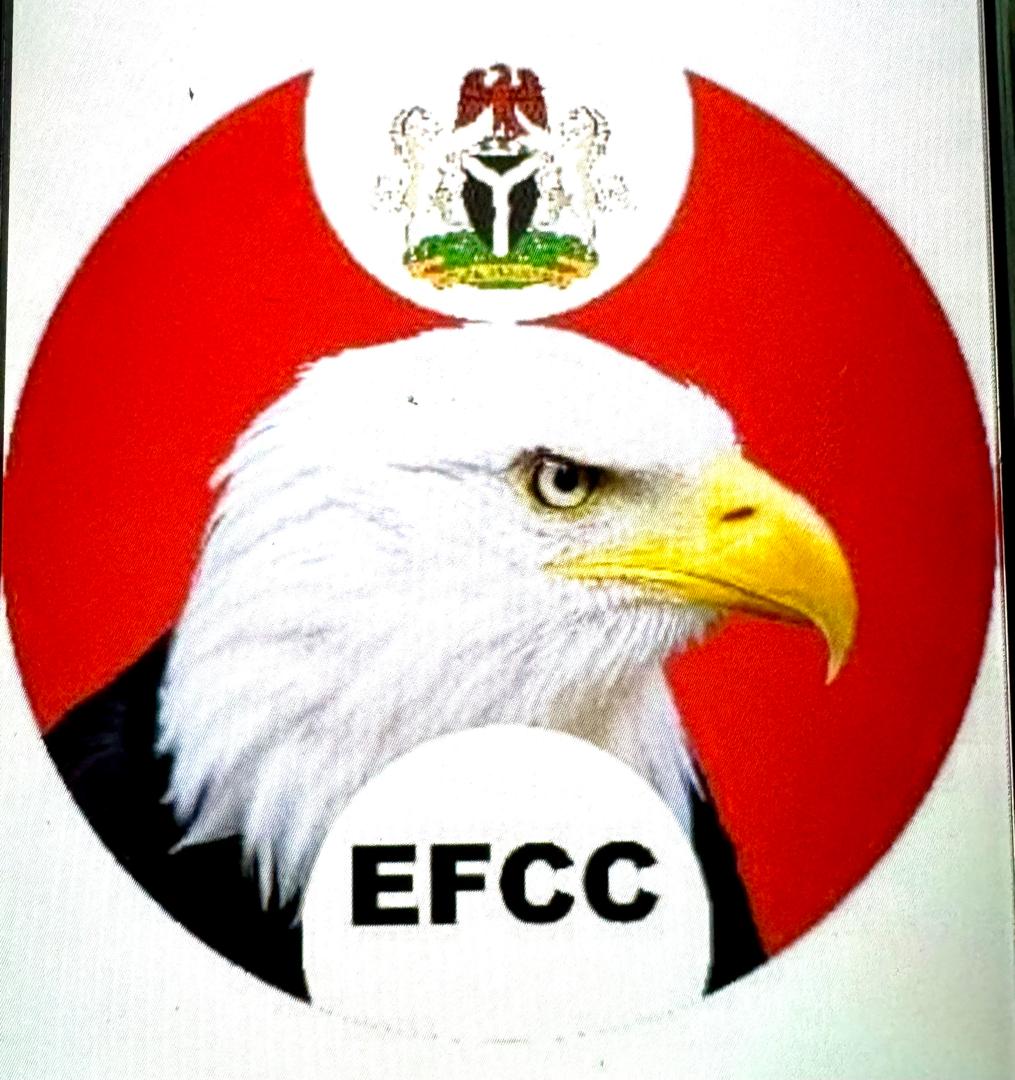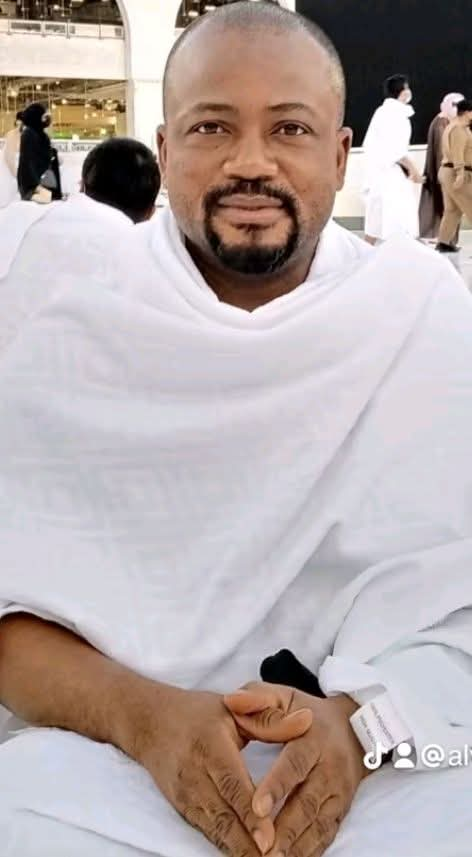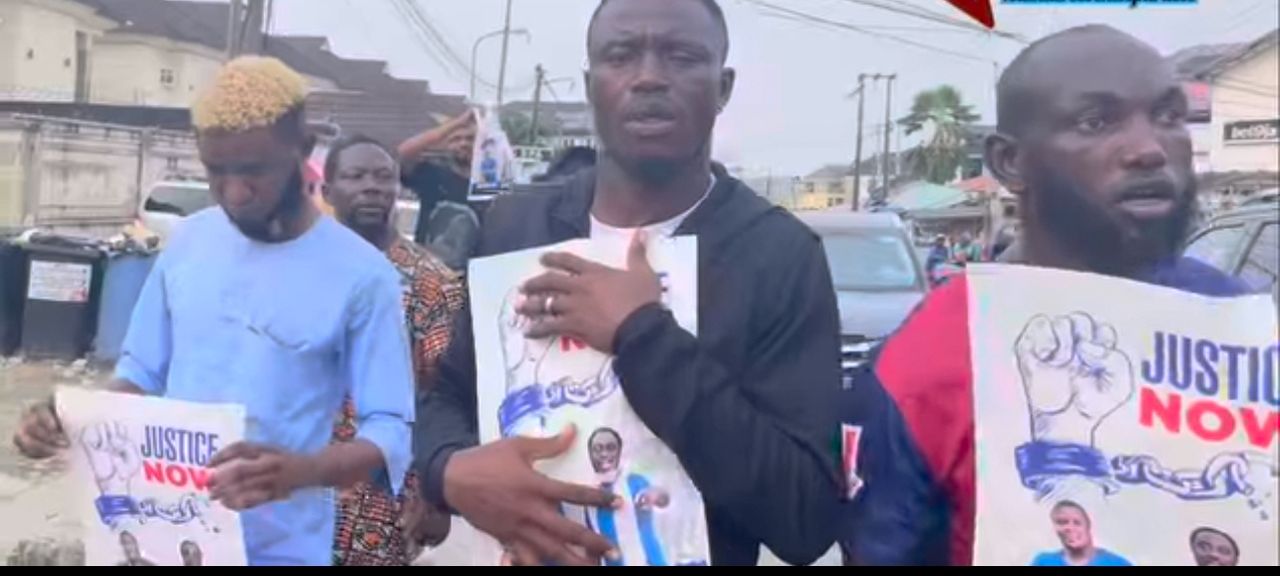society
EFCC: AS THE NATION AWAITS THE SUPREME COURT By Tunde Nasir

EFCC: AS THE NATION AWAITS THE SUPREME COURT
By Tunde Nasir
Since the new EFCC Chairman, Olanipekun Olukoyede assumed office about one year ago, the fight against corruption, financial and cyber crimes, has taken a new heightened and reinvigorated dimension to the admiration of those who are genuinely concerned about fighting the cankerworm of corruption that has bedeviled our nation almost to a standstill.
Ola Olukoyede, a Pastor, seems to be following the Biblical injunction, as he declared from the outset his intention to combat the evil of corruption vigorously as a means of fostering economic development of the nation.
Perhaps, following the promise of God in Joel 2:25: “I shall restore to you the years of the locust, the cankerworm and the caterpillar have eaten…”
However, knowing the certification, experience, prowess and international connection that Olukoyede was armed with and bringing into the office, it was not surprising that opposition to his appointment started as soon as his name was announced by President Tinubu on October 12, 2023 and his confirmation by the Senate on October 18, 2023. Those who did not object to Olukoyede’s previous appointments as Chief of Staff to the Chairman of EFCC and also as a Secretary to the Commission, suddenly turned around to say that he was not qualified to be appointed as chairman!
However, Olukoyede has continued to soldier-on, delivering on his mandate, undeterred and undaunted. Within 12 months, a record 3,455 convictions were secured and monetary recoveries from October 2023
to September 2024 stood at
N248,750,049,365.52 (Two Hundred and Forty-Eight Billion, Seven Hundred and Fifty Millon, Forty- Nine Thousand, Three hundred and Sixty-Five Naira, Fifty-Two Kobo), $105,423,190.39 (One Hundred and Five Million, Four Hundred and Twenty-Three Thousand, One Hundred and Ninety Dollars, Thirty-Nine Cents) and £53,133.64 (Fifty-Three Thousand, One Hundred and Thirty- Three Pounds, Sixty-Four Pence); apart from recoveries in other foreign currencies.
On the Issue of corruption trials, Olukoyede revived or initiated court cases against high-profile politically-exposed persons, including former Ministers and Governors. Among the politically-exposed personalities who were hitherto considered untouchable and now on trial for corruption are former governors Yahaya Adoza Bello(Kogi), Abdulfatah Ahmed (Kwara), and Darius Dickson Ishaku (Taraba). Former Ministers Saleh Mamman and Olu Agunloye have been put on trial too.
Correspondingly, the Commission has faced the biggest ever campaign of calumny, blackmail, public protests by sponsored NGOs, simulated attacks in the media and well-oiled, sponsored litigations to undermine the operations of the Commission and its unrelenting Chairman.
Chief among the litigations against Commission is the lawsuit initiated at the Supreme Court by Kogi State Government challenging the establishment and constitutionality of the EFCC. The suit, according to the plaintiff, posited that the establishment of EFCC was an affront on principles of federalism.
About 15 other states reportedly joined Kogi State in the suit and asked that their grievances against the EFCC be consolidated. There have also been comments and actions for and against the court action instituted by Kogi State Government and its collaborating governors.
A former President of the Nigerian Bar Association (NBA), Dr. Olisa Agbakoba (SAN), has written to the National Assembly about constitutional issues related to anti-corruption agencies in Nigeria and factors inhibiting the government’s objective of abolishing corruption, as stated in Section 13 of the Constitution.
In two separate letters to the Senate and House of Representatives, dated October 14, 2024, he said the Economic and Financial Crimes Commission (EFCC) was “an unlawful organisation that he believed was unconstitutionally established.”
However, in the contrary, respected lawyer and Senior Advocate of Nigeria, Femi Falana (SAN), countered Agbakoba. Falana said: “For me, the ICPC and the EFCC like the Code of Conduct Tribunal (CCT) have come to stay. What we should be demanding are measures to make these institutions autonomous and not under the control of any government,”
He added: “And the Supreme Court has maintained rather repeatedly concerning the EFCC and ICPC, that these are crime fighting bodies, and should not be under the control of the Federal Government. They are agencies to fight economic crimes in our country, to fight financial crimes in our country, to fight corruption in our country.”
However, with the controversy generated by the Kogi State’s suit against the EFCC and its discussion in the court of public opinion, some states who initially applied to join the suit have beaten a quick retreat, applying to the Supreme Court to withdraw from the suit. Among the states that have withdrawn are Jigawa, Anambra, Adamawa, Ebonyi and Benue states, who have separately filed motions before the Supreme Court, saying they are no longer interested.
In the case of Benue State, Governor Hyacinth Alia suspended the State’s Attorney-General and Commissioner for Justice, Bemsen Mnyim, for acting “unilaterally in joining the suit without the approval of his principal.”
The development came on the heels of the declaration by the Zamfara State Governor, Dauda Lawal, that the state was neither aware nor part of the suit challenging the legality of EFCC.
In the case of Ogun State, the Attorney-General and Commissioner for Justice, Mr. Oluwashina Ogungbade denied ever initiating any case or being part of Kogi State’s suit against the EFCC.
Speaking to newsmen in Abeokuta, Ogungbade wondered why some sections of the media continued to include Ogun state in the list of the states in court against the EFCC.
“We don’t have a suit against EFCC. We never filed any action against EFCC challenging its constitutionality. We already issued a statement to that effect clarifying that we never had any suit attacking the EFCC’s constitutionality and that we did not join the suit filed at the Supreme Court filed by some other states in that regard. So, I am surprised that some media outlets are still running reports that include and mention Ogun State as one of the states challenging the EFCC’s existence when that is not the case.“
According to the statement by Ogun State government, “the constitutionality of the EFCC and the Independent Corrupt Practices Commission (ICPC) had since been determined by the Supreme Court, and Ogun State considers discussions on the issue closed.”
The Ogun State government stated that it had “no factual reason or recent development to reopen the question of the EFCC’s constitutionality.”
It added that “as a federating unit with law enforcement agencies of its own, it had no desire to undermine the Federal Government’s law and order objectives.”
One of the vociferous anti-corruption groups, the Vanguard for Credible Representation (VCR) has lauded those states that have withdrawn from the Kogi’s suit against EFCC at the Supreme Court. In a statement signed by VCR’s Head of Mission, Onche Ugbabe, the group said it was “heartwarming that some state governors were dissociating themselves from the suit and lending their support to the fight against corruption.”
The statement reads: “It is heartwarming that Governors Hyacinth Alia and Dauda Lawal have publicly dissociated themselves from the suspicious move orchestrated by some state governments. We also commend the Governments of Anambra, Adamawa and Ebonyi states for heeding the voice of reason and withdrawing from the suit.”
The group hailed erudite lawyers like Mr. Femi Falana SAN and Kayode Oladele who have faulted the suit and its backers.
“It is highly gratifying that erudite lawyers like Mr. Femi Falana SAN and Hon. Kayode Oladele have publicly condemned the unpopular move, citing a plethora of judicial decisions of the Supreme Court on the legality of the anti-corruption agencies.
“It is in the light of this that all well-meaning individuals and institutions should lend their support to the war against corruption and not seek to thwart it by any scheme or schism,” the group said.
As the nation awaits the Supreme Court verdict, it is expected that more Governors will see reasons and withdraw like others who are not participating, or have withdrawn from the suit. As at now, there are more state governments that have distanced themselves from the suit than those who are before the Supreme Court. The bell ticks!
Tunde Nasiru, a Public Policy Advocate based in Abuja, sent this through [email protected]
society
Ajiran Youth Protest Over Deaths of Two Residents, Demand Justice

Ajiran Youth Protest Over Deaths of Two Residents, Demand Justice
The Ajiran community of Lagos State erupted in a powerful protest on Tuesday as local youths took to the streets to express their grief and anger over the tragic murders of Prince Ademola Akintoye and Sherrif Agboworin. The demonstration follows the recent decision to reopen the murder case, an investigation that has already led to the arrest of over nine suspects in connection with the heinous crimes committed more than a year ago.
Carrying vibrant banners and poignant posters featuring the faces of the deceased, the protesters marched through the heart of their community while singing somber dirges to honor their memory. With chants of unity and justice ringing in the air, they called on both the Lagos State Government and the Lagos State Police Command to ensure that those responsible are swiftly and decisively brought to justice.
The youth leaders emphasized that peace and normalcy will remain elusive in Ajiran until all those complicit in the killings are held accountable. They articulated that true justice is the only way to restore tranquility and honor the lives of Akintoye and Agboworin, whom they described as innocent victims of a grave injustice.
Speaking on behalf of the demonstrators, youth leader Mr. Kehinde Oladele urged law enforcement to conduct a thorough and fair investigation. He asserted that every individual involved including the nine arrested suspects must face the full extent of the law. Especially Hammed Tajudeen, the principal suspect mentioned by others in custody, whom they believe should not escape scrutiny.
“The reopening of this case after more than a year is a critical first step towards achieving justice and fairness for our brothers,” Oladele said. “We urge the police to get to the root of the matter. Those mentioned during the investigation, especially Hammed Tajudeen, should not be spared.”
The atmosphere in the community grew increasingly tense last week following speculation that prominent businessman Aare Bashir Olawale Fakorede was implicated in the unrest. The speculation appeared to stem from his alleged influence on the reopening of the murder investigation. This misunderstanding escalated when a group of protesters targeted his filling station in Ikate, vandalizing his properties and disrupting business operations in the gas station based on the false assumption that Fakorede was behind the police’s renewed inquiries.
In response to the rising tensions and misinformation, Fakorede’s spokesperson, Ola Muhammed, issued a comprehensive statement denying any connection between Fakorede and the unrest. The spokesperson emphasized that rumors suggesting the businessman orchestrated the revival of the murder case were completely unfounded.
“I feel it is crucial to clarify, for the sake of transparency and historical accuracy, that this entire ordeal is in no way related to me,” Fakorede stated. “I am also very interested to see that the culprits are brought to book. I categorically affirm that I have never been involved in any business dealings with Mr. Hammed Tajudeen.”
Fakorede further elaborated that the recent protests which led to the destruction of his property were reportedly instigated by Tajudeen and others who seem determined to manipulate the narrative and cast suspicion upon him. Fakorede expressed his own strong commitment to uncovering the truth surrounding the deaths.
As the police investigation progresses, it has become increasingly apparent that all accusing fingers are pointing to Hammed Tajudeen who is currently evading capture, adding another layer of complexity and urgency to the ongoing situation. Community members have questioned why he remains at large instead of submitting himself to the police for questioning if he is truly innocent of the allegations against him.
Community leaders are now emphasizing the need for dialogue to address the root causes of the unrest and work toward restoring harmony within Ajiran, even as the demand for justice remains at the forefront of public consciousness.
society
Ramadan: Al-Yusuff International Travels and Tours Boss Greets Muslims

Ramadan: Al-Yusuff International Travels and Tours Boss Greets Muslims
As the holy month of Ramadan begins across the globe, the Chief Executive Officer of Al-Yusuff International Travels and Tours Limited, Dr. Abdulmajeed Oladele, has extended his heartfelt greetings to Muslims worldwide.
In his message, the respected business mogul expressed gratitude to Almighty Allah for the privilege of witnessing this year’s sacred month.
“We glorify Allah for granting us the grace and opportunity to witness this year’s month of blessings. Ramadan is a sacred and special month for all Muslims, a month greater than many others, filled with piety, mercy, and abundant blessings.
I congratulate all Muslims across the world. Let us faithfully observe the requirements of Ramadan. May Allah (SWT) grant our heart’s desires and make this period easy and rewarding for us all.”
Dr. Oladele urged Muslims to embrace the spiritual significance of Ramadan through devotion, charity, self-discipline, and prayers for peace and prosperity.
society
UKA UNVEILS THREE-TIER ATC PLATFORM AS MONARCH ANNOUNCES $10BN GOLD-BACKED MILESTONE

UKA UNVEILS THREE-TIER ATC PLATFORM AS MONARCH ANNOUNCES $10BN GOLD-BACKED MILESTONE
Emperor Nobilis Prof Solomon Winning declares global recognition of ATC ecosystem, urges citizens and partners to embrace unified digital, crypto and gold-backed financial structure
The Reigning Monarch of the United Kingdom of Atlantis (UKA), Emperor Nobilis Prof Solomon Winning, has formally announced what he described as a historic milestone in the financial evolution of the Atlantis nation and empire worldwide, the consolidation and global recognition of the ATC financial ecosystem backed by a $10 billion gold reserve.
In a voice message released from the Office of the Throne, the Monarch expressed gratitude to God and to citizens and partners across the globe for what he termed a “defining achievement” in the journey of the United Kingdom of Atlantis.
According to him, the ATC asset structure, supported by a $10 billion gold-backed certificate, has now been positioned among the world’s leading capitalisation financial platforms, ranking number 12 globally.
“We appreciate God for the milestone achieved of our 10 billion gold-backed certificate of ATC assets. We are delighted to inform our esteemed citizens, partners, viewers and friends all over the world that ATC has come to stay,” the Monarch declared.
Three Distinct but Interconnected ATC Platforms
Emperor Winning explained that the UKA Government and the Atlantis nation have officially released three integrated ATC platforms to the general public. He emphasised that while each platform serves a distinct purpose, they are structured to interact seamlessly for effective management, business transactions and global trading operations.
1.ATC Digital (Government Platform)
The first platform, known as ATC Digital, is the official government-backed digital transaction system. It is designed to facilitate digital financial operations within the UKA ecosystem and serve as the administrative and transactional backbone of the nation’s digital economy.
The Monarch described it as the formally recognised digital framework governed directly by the government under the Throne.
ATC Gold Version (Business and Trade Platform). The second platform, referred to as the ATC Gold Version, is primarily tailored for business trade, commercial exchange and transactional fluidity. It is structured to enhance business-to-business engagement, exchangeability and broader economic interaction.
“This version is mainly for business trade, business exchange and commercial transactions,” he clarified.
ATC Crown Coin (Crypto and Visitor Platform)
The third platform, known as the ATC Crown Coin, represents the Atlantis Crown Coin and is linked to what the monarch described as the Atlantean Bank Gold structure. This version operates as a crypto and digital hybrid, including visitor engagement capabilities and broader exchange functions.
(atlantisgoldbank.org
The Digital/Cryto currency Version
Atlantian Crown Gold (E-ATC) https://share.google/a7Jns9VtrMKCZ6Prk
The E-ATC purely for Trading and Exchang
Atlantean Crown (ATC) – The Future of Digital Currency https://share.google/1EhdkkDBFvBLLgfR1
The Digital version for Government
We also Have DEOS INTERNATIONAL Bank (DIB)
And ATCB)
The Monarch indicated that all three platforms are interconnected to ensure efficiency, transparency and global recognition.
“Please do not be confused. The United Kingdom of Atlantis has three major versions of ATC. Two are crypto-based, one is digital; one is also a hybrid of crypto and digital. All three interact together for effective management and effective business transactions.”
Global Recognition and Expansion Vision
Emperor Winning further asserted that the ATC ecosystem is already recognised internationally and positioned within the global financial framework. “Our platforms are presently recognised in the whole world,” he said, while encouraging existing holders of ATC assets to remain confident in the system.
He congratulated all ATC holders and reiterated the Throne’s commitment to strengthening the ecosystem’s credibility, usability and cross-platform functionality.
A Strategic Financial Architecture
Observers say the three-tier structure reflects an attempt by the United Kingdom of Atlantis to create a multi-layered financial architecture combining government-regulated digital systems, crypto-based trade platforms and gold-backed reserve credibility.
By integrating digital governance with cryptocurrency and gold certification, the UKA appears to be positioning ATC as both a sovereign-backed asset and a tradable global instrument.
As the UKA advances its financial ambitions, the monarch’s message signals a push for adoption, participation and global engagement with the ATC ecosystem.
“If you are a holder of ATC, congratulations to you from the Throne. God bless you,” the monarch concluded.
The development marks another significant chapter in the evolving digital and gold-backed finance narrative emerging from the United Kingdom of Atlantis.
-

 celebrity radar - gossips6 months ago
celebrity radar - gossips6 months agoWhy Babangida’s Hilltop Home Became Nigeria’s Political “Mecca”
-

 society6 months ago
society6 months agoPower is a Loan, Not a Possession: The Sacred Duty of Planting People
-

 news6 months ago
news6 months agoTHE APPOINTMENT OF WASIU AYINDE BY THE FEDERAL GOVERNMENT AS AN AMBASSADOR SOUNDS EMBARRASSING
-

 society5 months ago
society5 months agoReligion: Africa’s Oldest Weapon of Enslavement and the Forgotten Truth









